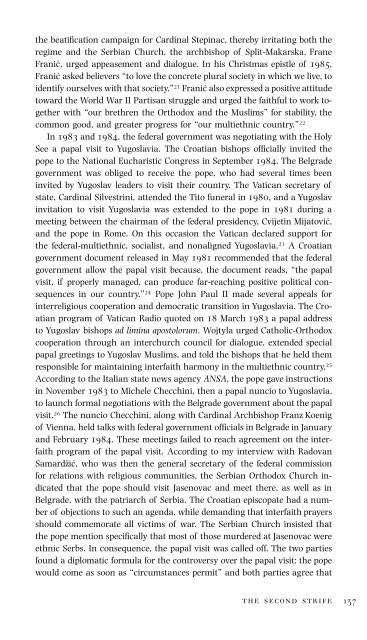Balkan Idols: Religion and Nationalism in Yugoslav States
Balkan Idols: Religion and Nationalism in Yugoslav States
Balkan Idols: Religion and Nationalism in Yugoslav States
You also want an ePaper? Increase the reach of your titles
YUMPU automatically turns print PDFs into web optimized ePapers that Google loves.
the beatification campaign for Card<strong>in</strong>al Step<strong>in</strong>ac, thereby irritat<strong>in</strong>g both the<br />
regime <strong>and</strong> the Serbian Church, the archbishop of Split-Makarska, Frane<br />
Franić, urged appeasement <strong>and</strong> dialogue. In his Christmas epistle of 1985,<br />
Franić asked believers “to love the concrete plural society <strong>in</strong> which we live, to<br />
identify ourselves with that society.” 21 Franić also expressed a positive attitude<br />
toward the World War II Partisan struggle <strong>and</strong> urged the faithful to work together<br />
with “our brethren the Orthodox <strong>and</strong> the Muslims” for stability, the<br />
common good, <strong>and</strong> greater progress for “our multiethnic country.” 22<br />
In 1983 <strong>and</strong> 1984, the federal government was negotiat<strong>in</strong>g with the Holy<br />
See a papal visit to <strong>Yugoslav</strong>ia. The Croatian bishops officially <strong>in</strong>vited the<br />
pope to the National Eucharistic Congress <strong>in</strong> September 1984. The Belgrade<br />
government was obliged to receive the pope, who had several times been<br />
<strong>in</strong>vited by <strong>Yugoslav</strong> leaders to visit their country. The Vatican secretary of<br />
state, Card<strong>in</strong>al Silvestr<strong>in</strong>i, attended the Tito funeral <strong>in</strong> 1980, <strong>and</strong> a <strong>Yugoslav</strong><br />
<strong>in</strong>vitation to visit <strong>Yugoslav</strong>ia was extended to the pope <strong>in</strong> 1981 dur<strong>in</strong>g a<br />
meet<strong>in</strong>g between the chairman of the federal presidency, Cvijet<strong>in</strong> Mijatović,<br />
<strong>and</strong> the pope <strong>in</strong> Rome. On this occasion the Vatican declared support for<br />
the federal-multiethnic, socialist, <strong>and</strong> nonaligned <strong>Yugoslav</strong>ia. 23 A Croatian<br />
government document released <strong>in</strong> May 1981 recommended that the federal<br />
government allow the papal visit because, the document reads, “the papal<br />
visit, if properly managed, can produce far-reach<strong>in</strong>g positive political consequences<br />
<strong>in</strong> our country.” 24 Pope John Paul II made several appeals for<br />
<strong>in</strong>terreligious cooperation <strong>and</strong> democratic transition <strong>in</strong> <strong>Yugoslav</strong>ia. The Croatian<br />
program of Vatican Radio quoted on 18 March 1983 a papal address<br />
to <strong>Yugoslav</strong> bishops ad lim<strong>in</strong>a apostolorum. Wojtyla urged Catholic-Orthodox<br />
cooperation through an <strong>in</strong>terchurch council for dialogue, extended special<br />
papal greet<strong>in</strong>gs to <strong>Yugoslav</strong> Muslims, <strong>and</strong> told the bishops that he held them<br />
responsible for ma<strong>in</strong>ta<strong>in</strong><strong>in</strong>g <strong>in</strong>terfaith harmony <strong>in</strong> the multiethnic country. 25<br />
Accord<strong>in</strong>g to the Italian state news agency ANSA, the pope gave <strong>in</strong>structions<br />
<strong>in</strong> November 1983 to Michele Checch<strong>in</strong>i, then a papal nuncio to <strong>Yugoslav</strong>ia,<br />
to launch formal negotiations with the Belgrade government about the papal<br />
visit. 26 The nuncio Checch<strong>in</strong>i, along with Card<strong>in</strong>al Archbishop Franz Koenig<br />
of Vienna, held talks with federal government officials <strong>in</strong> Belgrade <strong>in</strong> January<br />
<strong>and</strong> February 1984. These meet<strong>in</strong>gs failed to reach agreement on the <strong>in</strong>terfaith<br />
program of the papal visit. Accord<strong>in</strong>g to my <strong>in</strong>terview with Radovan<br />
Samardzˇić, who was then the general secretary of the federal commission<br />
for relations with religious communities, the Serbian Orthodox Church <strong>in</strong>dicated<br />
that the pope should visit Jasenovac <strong>and</strong> meet there, as well as <strong>in</strong><br />
Belgrade, with the patriarch of Serbia. The Croatian episcopate had a number<br />
of objections to such an agenda, while dem<strong>and</strong><strong>in</strong>g that <strong>in</strong>terfaith prayers<br />
should commemorate all victims of war. The Serbian Church <strong>in</strong>sisted that<br />
the pope mention specifically that most of those murdered at Jasenovac were<br />
ethnic Serbs. In consequence, the papal visit was called off. The two parties<br />
found a diplomatic formula for the controversy over the papal visit: the pope<br />
would come as soon as “circumstances permit” <strong>and</strong> both parties agree that<br />
the second strife 137


